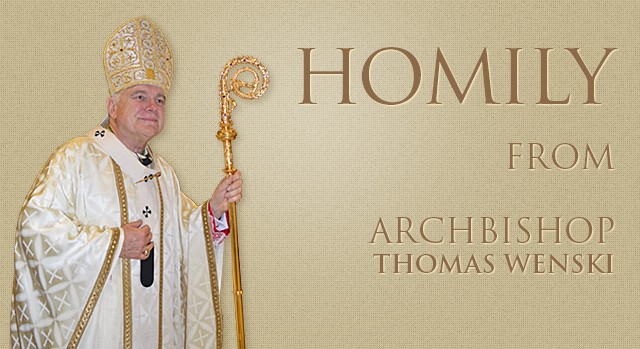By Archbishop Thomas Wenski - The Archdiocese of Miami
Homily by Archbishop Thomas Wenski at Mass for the opening of the Men's Conference at St. Mark's Catholic Church. Saturday, March 21, 2015.
"Some in the crowd who heard these words of Jesus said, ‘This is truly the Prophet.’ Others said, ‘This is the Christ.’ But others said, ‘The Christ will not come from Galilee, will he?’”
The controversy about Jesus we hear about in today’s Gospel reading sets the stage from what will soon follow – events that we will commemorate during Holy Week. That controversy still dogs us today: As we see in the Gospel, back then people were divided about Jesus and they are now as well. Jesus, as he moves towards Jerusalem and inevitable events that await him there, is staking out some extraordinary and audacious claims for himself. Some people – as we see in today’s Gospel - embraced those claims; others did not. But Jesus’ claims were such that you could be for him or against him; but they really don't leave you any room to take a neutral position before Jesus.
You might remember that shortly before his arrest and execution, Jesus told Thomas and the other Apostles: I am the Way, the Truth, and the Life.
This "I am” of Jesus is suggestive of the very name of God revealed to Moses.
Either he is what he said he was – or either he is a fraud, a false prophet or he is a delusional lunatic. There is really no middle ground.
If Jesus is who he said he was, then he is truly the Way, the Truth and the Life. If he is who he said he was, then he does have the power to redeem us, to forgive our sins, to bring us to new life.
Then, there is nothing for us to do but to set off along the Way that is Jesus – to conform ourselves to the Truth that is Jesus and to embrace the Life that is Jesus.
But, if we don’t believe that Jesus is the Way, then he must be for us necessarily "in the way.” As happened in Jerusalem two millennia ago, he will be in the way of our own ambitions, our own pursuits; he will be in the way of our will, of our assertion of self. And, if he is in the way, then we will try to avoid him, or go around him, and when we can’t: then, just like the authorities of his time, just like the crowds in Jerusalem, we will mock him, ridicule him and crucify him again.
In the Acts of the Apostles, the first followers of the Risen Lord were simply described as followers of the Way. And because they were of the way – and you can’t really be "of the Way” without yourself getting "in the way” as well - they too suffered ridicule, persecution and often martyrdom. As Jesus himself tells us: If they hate you, know that they hated me before you.
I like to tell the kids at confirmation that Jesus didn't suffer and die to give us a "feel good” religion. A "feel good” religion like that of those tele-evangelists who preach a gospel of "health, wealth and prosperity” is a heresy, a false teaching. Jesus didn't die to give us a "feel good” religion but a "do good” religion.
And doing good, doing what is right, will lead us the same path, the same way that Jesus walked. In other words, like Jesus, we too will be confronted with the cross. That’s why we began Lent on Ash Wednesday with a cross of ashes on our foreheads – and on Good Friday we will end Lent by reverently kissing a cross with an image of the crucified Jesus.
These days of prayer and fasting; these days of almsgiving and sacrifices are all about having us look at the crosses in our lives – and those crosses are many and varied. And we find them everywhere - at work, in our families, in those many events and occurrences of life - like health and aging - that remind us that we are not as self-sufficient or autonomous as we often pretend to be. And the question that Lent poses to us is simply: Do we wish to accept these crosses not as being "in our way” but as being "our way” to enter into the glory of Jesus, who in dying destroyed our death and in rising restored our life?

